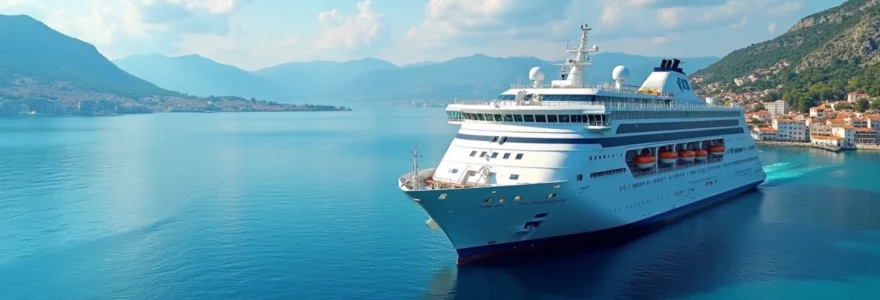Embarking on a Greek island-hopping adventure is a dream for many travellers. The azure waters of the Aegean and Ionian seas, dotted with picturesque islands, beckon visitors from around the world. At the heart of this quintessential Greek experience lies the extensive ferry network, connecting the mainland to over 200 inhabited islands. Understanding the ins and outs of Greek ferry travel is crucial for a smooth and enjoyable journey. From navigating bustling ports to selecting the right vessel, this comprehensive guide will prepare you for an unforgettable maritime odyssey through the Greek archipelago.
Greek ferry network: routes and operators
The Greek ferry system is a complex web of routes connecting numerous islands and coastal cities. This network forms the backbone of transportation in the Greek islands, offering both locals and tourists a reliable means of island-hopping. Understanding the major players and routes in this network is essential for planning your Greek island adventure.
Major greek ferry companies: blue star, hellenic seaways, and ANEK lines
Several ferry operators dominate the Greek maritime landscape, each with its own fleet and routes. Blue Star Ferries is renowned for its modern vessels and extensive coverage of the Cyclades and Dodecanese islands. Hellenic Seaways offers a mix of conventional and high-speed ferries, serving a wide range of destinations including the Saronic Gulf and Sporades islands. ANEK Lines specializes in routes to Crete and the Dodecanese, often in partnership with other operators.
Cyclades island hopping: santorini, mykonos, and naxos connections
The Cyclades island group is perhaps the most popular for island hopping, with its iconic white-washed villages and stunning beaches. Santorini, Mykonos, and Naxos form a golden triangle of sorts, connected by frequent ferry services. During peak season, you can expect multiple daily connections between these islands, offering flexibility in your travel plans. It’s worth noting that the journey times can vary significantly depending on the type of ferry chosen.
Piraeus port: hub for aegean and ionian sea routes
Piraeus, the main port of Athens, serves as the primary gateway to the Greek islands. This bustling port is a veritable maze of ferry terminals, each serving different island groups. From Piraeus, you can embark on journeys to the Cyclades, Dodecanese, Crete, and even some Ionian islands. Navigating Piraeus can be overwhelming for first-time visitors, so it’s advisable to arrive with ample time before your departure.
Seasonal variations in ferry schedules and frequencies
Greek ferry schedules are not static year-round. The peak tourist season, roughly from June to September, sees a significant increase in ferry frequencies and routes. During this time, you’ll find more options for island-hopping, including high-speed services. However, the shoulder seasons of spring and autumn still offer regular connections with the added benefit of fewer crowds. Winter sees a reduction in services, with some routes operating on a limited schedule or ceasing altogether.
Booking and ticketing processes for greek ferries
Securing your ferry tickets is a crucial step in planning your Greek island adventure. With multiple booking options available, it’s important to understand the pros and cons of each to ensure a smooth travel experience. From online platforms to traditional ticket offices, let’s explore the various ways to book your Greek ferry journey.
Online reservation systems: ferryhopper and direct operator platforms
In the digital age, online booking has become the preferred method for many travellers. Platforms like Ferryhopper offer a comprehensive overview of routes, schedules, and prices across multiple ferry operators. These aggregator sites allow you to compare options easily and book tickets for complex itineraries in one go. Alternatively, booking directly through ferry operator websites can sometimes yield special promotions or loyalty benefits for frequent travellers.
Ticket classes: economy, business, and cabin options
Greek ferries typically offer a range of ticket classes to suit different preferences and budgets. Economy class provides basic seating in shared areas, often with access to open decks. Business class offers more comfortable seating, often in dedicated lounges with better amenities. For longer journeys, especially overnight trips, cabin options range from shared dormitories to private suites with en-suite facilities. Consider the length of your journey and personal comfort preferences when selecting your ticket class.
Port ticket offices and Last-Minute bookings
While advance booking is recommended, especially during peak season, it’s still possible to purchase tickets at port ticket offices. This option can be useful for spontaneous trips or last-minute changes to your itinerary. However, popular routes and preferred classes may sell out, particularly in summer. If opting for port ticket purchases, arrive well in advance of your intended departure to allow time for queuing and potential language barriers.
Greek island pass: Multi-Island travel options
For extensive island-hopping adventures, some ferry operators offer multi-island passes. These can provide good value for travellers planning to visit several islands within a specific region or timeframe. However, it’s important to carefully compare the pass benefits against individual ticket purchases, as the savings may vary depending on your specific itinerary and travel dates.
On-board experience and amenities
The on-board experience can vary significantly depending on the type of ferry and operator you choose. From high-speed catamarans to large conventional vessels, each offers a unique journey. Understanding what to expect on board will help you prepare for a comfortable and enjoyable trip across the Greek seas.
Ferry types: High-Speed catamarans vs. conventional vessels
Greek ferry fleets typically include two main types of vessels: high-speed catamarans and conventional ferries. High-speed catamarans, often referred to as ‘flying cats’, offer faster journeys but may be more susceptible to cancellations in rough weather. These vessels usually have indoor seating only and can be more prone to causing seasickness. Conventional ferries, while slower, often provide a more stable journey and offer a wider range of amenities, including open decks for enjoying the sea views.
Dining options: Self-Service restaurants and cafeterias
Most Greek ferries offer on-board dining options, ranging from simple cafeterias to full-service restaurants. Self-service restaurants are common, offering a variety of hot meals, sandwiches, and snacks. Prices can be higher than on land, so budget-conscious travellers might consider bringing their own food. Cafeterias provide coffee, soft drinks, and light snacks throughout the journey. On longer routes, some ferries feature more upscale dining options with table service.
Entertainment facilities: lounges, shops, and open decks
To keep passengers entertained during longer journeys, many ferries offer various facilities. Lounges provide comfortable seating areas, often equipped with televisions showing news or movies. On-board shops sell souvenirs, travel essentials, and reading materials. Open decks are a highlight for many travellers, offering fresh air and panoramic views of the Greek islands. Some larger ferries may even feature small play areas for children or dedicated spaces for pets.
Sleeping accommodations: Airline-Style seats to luxury cabins
For overnight or long-distance journeys, Greek ferries offer a range of sleeping accommodations. Economy passengers often have access to airline-style reclining seats. For more comfort, various cabin types are available, from basic shared cabins to deluxe private rooms with en-suite bathrooms. Booking a cabin can provide a more restful journey, especially on overnight routes, allowing you to arrive at your destination refreshed and ready to explore.
Practical considerations for greek ferry travel
While the allure of Greek island-hopping is undeniable, there are several practical aspects to consider for a smooth journey. From arrival times to luggage policies, understanding these details will help you navigate the Greek ferry system with confidence and ease.
Port arrival times and Check-In procedures
Arriving at the port with ample time before departure is crucial. Most ferry operators recommend checking in at least 30 minutes before sailing for foot passengers, and up to 1 hour for those travelling with vehicles. During peak season, it’s wise to allow even more time, especially at busy ports like Piraeus. Check-in procedures typically involve presenting your booking confirmation and ID, after which you’ll receive a boarding pass. Some larger ferries may have separate check-in desks for different classes of travel.
Luggage policies and storage on greek ferries
Greek ferries generally have generous luggage allowances compared to airlines, but it’s still important to pack sensibly. Most ferries don’t have formal weight restrictions for foot passengers, but you should be able to carry and store your luggage safely. Large ferries often have designated luggage storage areas, while on smaller vessels, you might need to keep your bags with you. Valuable items should always be kept on your person. For travellers with vehicles, additional luggage can usually be left in the car, but access to the vehicle deck during the journey is typically restricted.
Seasickness prevention: positioning and medication options
Seasickness can be a concern for some travellers, especially on smaller vessels or during rough weather. To minimize the risk, try to sit in the middle of the ship where movement is less pronounced. Focusing on the horizon or getting fresh air on open decks can also help. For those prone to motion sickness, over-the-counter medications are available at Greek pharmacies. Natural remedies like ginger or acupressure wristbands are popular alternatives. Remember to take any medication well before the journey begins for maximum effectiveness.
Wi-fi connectivity and mobile network coverage at sea
Staying connected while at sea is increasingly possible on Greek ferries. Many vessels offer Wi-Fi services, though the quality and cost can vary. Some operators provide complimentary Wi-Fi, while others charge a fee. Mobile network coverage is generally good near the coastline and between closely spaced islands, but may become patchy in open waters. It’s advisable to download any essential information or entertainment before your journey, as internet speeds can be slower than on land.
Navigating greek ferry delays and cancellations
While Greek ferries are generally reliable, various factors can lead to delays or cancellations. Understanding these potential disruptions and knowing your rights as a passenger can help you navigate unexpected changes to your travel plans with minimal stress.
Weather-related disruptions: meltemi winds and storm patterns
The Meltemi winds , strong northerly summer winds in the Aegean Sea, can significantly impact ferry schedules. These winds typically peak in July and August, potentially causing delays or cancellations, especially for smaller vessels and high-speed services. Winter storms can also disrupt ferry operations, particularly in open sea crossings. It’s advisable to build some flexibility into your itinerary, especially if travelling during these potentially volatile weather periods.
Strike actions: understanding greek maritime union activities
Strikes by maritime unions, while not frequent, can occur and impact ferry services. These are usually announced in advance, allowing travellers to adjust their plans. Strikes may affect all ferry services or be limited to specific operators or routes. Staying informed through local news sources or your ferry operator’s communication channels is crucial during such events.
Passenger rights and compensation for disrupted travel
European Union regulations protect passenger rights in cases of significant delays or cancellations. For delays exceeding 90 minutes, ferry operators are required to provide updates, refreshments, and potentially alternative transportation or accommodation. In cases of cancellation, passengers are entitled to either a full refund or re-routing. It’s important to keep all travel documents and receipts for any additional expenses incurred due to disruptions, as these may be needed for compensation claims.
Alternative travel options: domestic flights and island airports
When ferry services are disrupted, considering alternative travel methods can save your itinerary. Many Greek islands have airports with connections to Athens and other major cities. While typically more expensive than ferry travel, domestic flights can be a time-saving option, especially for longer routes. Some islands also offer inter-island flights, providing another layer of flexibility in your travel plans. In cases of prolonged ferry disruptions, these air links can be invaluable for maintaining your travel schedule.
Navigating the Greek ferry system may seem daunting at first, but with proper planning and understanding, it becomes an integral part of the Greek island experience. From the excitement of departing bustling ports to the thrill of spotting your destination on the horizon, ferry travel offers a unique perspective on the Greek archipelago. By considering the various aspects discussed – from booking processes to on-board amenities and potential disruptions – you’ll be well-prepared to embark on your Greek island-hopping adventure. Remember, the journey is as much a part of the experience as the destination itself in the enchanting world of Greek island exploration.


